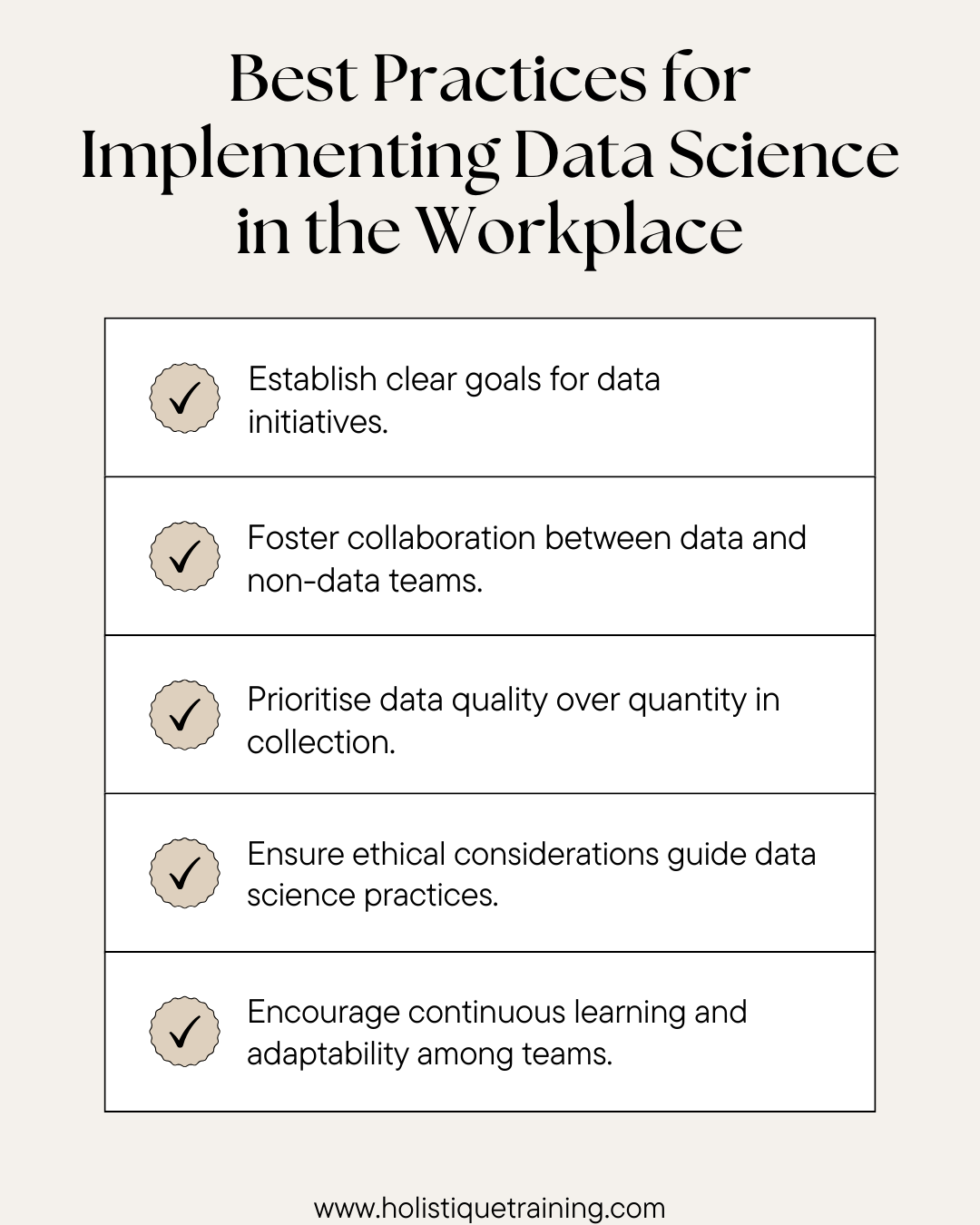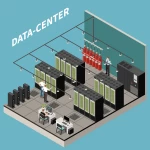- Table of Contents
- Introduction
- What Is Data Science?
- Benefits of Utilising Data Science in the Workplace
- The Role of Data Science in Business Decision Making
- Challenges of Leveraging Data Science
- The Process of Applying Data Science in Your Organisation
- Artificial Intelligence & Data Science
- Examples of Companies Who Leveraged Data Science
- Conclusion
Introduction
Imagine a world where every decision you make is backed by powerful insights, where the choices you face are guided not just by intuition but by a deep understanding of the data at hand. Welcome to the era of data science, a transformative field that has redefined the way we approach problems, make decisions, and drive innovation. In this exploration of data science and its pivotal role in decision making, we will delve into the intricacies of this evolving discipline, its incorporation in various sectors, the benefits it brings to the workplace, the challenges it poses, and how organisations can effectively apply it to navigate the complex landscape of decision making.
What Is Data Science?
At its core, data science is a multidisciplinary field that encompasses a range of techniques, algorithms, and processes aimed at extracting valuable insights and knowledge from structured and unstructured data. It goes beyond traditional statistical methods by combining expertise in computer science, mathematics, and domain-specific knowledge. The journey of data science often begins with data collection, followed by data cleaning, exploration, modelling, and interpretation.
Incorporating a diverse set of tools such as statistical analysis, machine learning, and data visualisation, data science is not just about crunching numbers; it's about uncovering patterns, making predictions, and extracting actionable intelligence. The goal is to turn raw data into meaningful information that drives informed decision making.
Benefits of Utilising Data Science in the Workplace
In the fast-paced world of business, where every decision can make a profound impact on success or failure, the incorporation of data science is akin to wielding a powerful torch that illuminates the path forward. The adoption of data science in the workplace is not just a technological trend but a strategic imperative that brings a multitude of benefits, reshaping the very fabric of how organisations operate and make decisions. In 2019, statistical insights highlighted the paramount benefits that companies worldwide derived from employing data and analytics. Approximately 64 percent of respondents affirmed that the utilisation of data and analytics had led to notable enhancements in efficiency and productivity. Let’s discuss other benefits that data science brings to the table:
Data-Driven Decision Making
At the heart of the benefits lies the ability to make decisions grounded in data. No more relying solely on gut feelings or past experiences—data science provides decision-makers with a wealth of insights derived from meticulous analysis of relevant data. This shift from intuition to evidence is a game-changer, reducing the inherent risks associated with decision making and instilling a culture of informed choices.
Competitive Edge and Market Insights
In the modern business landscape, staying ahead of the competition is paramount. Data science acts as a compass, guiding organisations through the intricate terrain of market trends, consumer behaviour, and competitive landscapes. By analysing vast datasets, businesses gain a comprehensive understanding of market dynamics, enabling them to adapt swiftly to changing conditions and seize opportunities before competitors.
Operational Efficiency and Cost Reduction
Beyond strategic decision-making, data science plays a pivotal role in optimising day-to-day operations. Through the lens of historical data, organisations can identify inefficiencies, streamline processes, and reduce operational costs. This newfound efficiency is not merely a cost-saving measure; it is a pathway to enhanced customer satisfaction, as streamlined operations often translate to quicker and more reliable services.
Personalisation of Products and Services
The era of one-size-fits-all is rapidly fading. Customers now expect personalised experiences, and data science is the engine driving this shift. By analysing customer data, businesses can tailor their products and services to individual preferences, creating a more intimate and satisfying relationship with their customer base. This personalisation not only fosters brand loyalty but also opens up new avenues for revenue generation.
Risk Management and Predictive Analytics
Predicting the future might seem like an ambitious goal, but with data science, it becomes a tangible reality. Through predictive analytics, organisations can assess potential risks, forecast market trends, and anticipate future challenges. This proactive approach to risk management is invaluable, providing decision-makers with the foresight needed to navigate uncertain landscapes and make preemptive strategic moves.
Improved Customer Experiences
Customer-centricity is a mantra echoed across industries, and data science is the key to unlocking superior customer experiences. By analysing customer feedback, preferences, and behaviour, businesses can fine-tune their products and services to meet and exceed expectations. This not only enhances customer satisfaction but also fosters long-term relationships and brand advocacy.
Informed Resource Allocation
Efficient resource allocation is a hallmark of successful organisations. Data science aids decision-makers in allocating resources—be it capital, manpower, or time—with precision. By identifying areas of high impact and potential return on investment, organisations can ensure that resources are directed where they will have the most significant impact on organisational goals.
Strategic Planning and Innovation
Data science is a catalyst for strategic planning and innovation. In fact, statistics show that a substantial majority, three out of every five organisations, are leveraging data analytics as a driving force behind business innovation. Armed with insights derived from data, organisations can chart a course for the future, identifying emerging trends and areas for innovation. This forward-looking approach is not just about surviving in the present but thriving in the ever-evolving landscape of industry disruptions and technological advancements.
Enhanced Decision-Maker Accountability
In the era of data science, decisions are not made in isolation but are backed by a trail of data-driven evidence. This inherently enhances accountability within organisations. Decision-makers are not only responsible for the outcomes of their choices but also for the process by which those choices were made. This accountability fosters a culture of responsibility and continuous improvement.
In short, the benefits of utilising data science in the workplace extend far beyond the realm of technology. It is a strategic imperative that empowers organisations to navigate the complexities of the modern business landscape with confidence. From driving operational efficiency to shaping innovative strategies, data science is the beacon guiding organisations towards a future where decisions are not just made—they are illuminated by the power of data.
The Role of Data Science in Business Decision Making
In the intricate dance of business, decisions are the choreography that shapes the narrative of success or failure. The traditional approach of decision-making, relying on gut instincts and historical practices, is evolving into a more nuanced and informed process, thanks to the pivotal role of data science. This transformative discipline is not just a tool; it's a guiding force that empowers decision-makers to navigate the complexities of the business landscape with unparalleled insight. Let's delve into the multifaceted role of data science in shaping the decision-making processes within organisations:
1. Predictive Analytics
One of the crown jewels in the data science arsenal is predictive analytics. By analysing historical data and identifying patterns, organisations can make informed predictions about future trends. This capability is particularly potent in industries where anticipating market shifts, consumer behaviours, and economic conditions is critical. From anticipating customer demand to predicting the success of marketing campaigns, predictive analytics equips decision-makers with a crystal ball of sorts, enabling strategic planning with foresight.
2. Evidence-Based Decision Making
Data science injects a healthy dose of objectivity into decision-making processes. Instead of relying solely on intuition or anecdotal evidence, decision-makers can turn to data-driven insights as a foundation for their choices. This shift from subjective decision-making to evidence-based decision-making not only minimises the risks associated with gut instincts but also instils a culture of accountability. Decisions are no longer made in the dark; they are supported by a robust framework of data.
3. Optimising Operations Through Data-Driven Insights
In the pursuit of operational excellence, data science serves as a guiding compass. By analysing vast datasets related to internal processes, organisations can identify bottlenecks, streamline workflows, and optimise resource allocation. This optimisation is not a mere cost-cutting measure; it's a strategic manoeuvre that enhances operational efficiency, improves service delivery, and ultimately contributes to the organisation's bottom line.
4. Market Intelligence and Competitive Edge
In a competitive business landscape, staying ahead requires more than just a reactive approach. Data science provides organisations with the tools to proactively gather market intelligence. Through analysis of competitor performance, market trends, and consumer preferences, decision-makers can make strategic moves that position their organisations as industry leaders. The competitive edge gained through data-driven insights is not just about survival—it's about thriving in dynamic markets.
5. Strategic Resource Allocation
Efficient resource allocation is a hallmark of successful organisations. Data science plays a pivotal role in guiding decision-makers on where and how to allocate resources for maximum impact. Whether it's capital investments, manpower deployment, or time management, data-driven insights ensure that resources are directed toward areas that align with organisational goals and have the potential for significant returns.
6. Risk Mitigation and Proactive Decision-Making
Risks are inherent in business, but data science equips decision-makers with the ability to assess and mitigate these risks proactively. Through advanced analytics and scenario modelling, organisations can anticipate potential challenges, plan for contingencies, and make decisions that act as preventative measures. This proactive approach to risk management is a testament to the strategic value of data science in decision-making.
7. Customer-Centric Decision Making
In an era where customer experience reigns supreme, data science enables decision-makers to adopt a customer-centric approach. By analysing customer behaviour, feedback, and preferences, organisations can tailor their products and services to meet the evolving needs of their target audience. This customer-centric decision-making not only enhances satisfaction but also fosters brand loyalty in an increasingly competitive market.
8. Iterative Decision-Making with Continuous Improvement
Data science transforms decision-making from a one-time event into an iterative process. Continuous monitoring and feedback loops ensure that decisions are not static but evolve with changing conditions. This iterative approach, coupled with the ability to learn from past outcomes, promotes a culture of continuous improvement within organisations.
9. Strategic Planning and Innovation
In the realm of strategic planning, data science is a powerful ally. By analysing market trends, emerging technologies, and consumer behaviours, decision-makers can chart a course for future growth and innovation. This forward-looking approach, fueled by data-driven insights, allows organisations to not only adapt to change but also drive change within their industries.
10. Enhanced Decision-Maker Collaboration
Effective decision-making is not a solo endeavour. Data science facilitates collaboration among decision-makers by providing a common language—data. Whether it's a marketing team analysing campaign performance or executives strategising on market entry, data-driven insights create a shared understanding that fosters collaboration and collective decision-making.
In essence, the role of data science in business decision-making transcends the confines of a supporting tool; it is the catalyst that propels organisations into an era where choices are not just made—they are empowered by data. As decision-makers harness the capabilities of data science, they are not merely responding to challenges; they are sculpting the future of their organisations with a newfound clarity and precision.
Challenges of Leveraging Data Science
While data science has become a beacon illuminating the path to informed decision-making, the journey is not without its share of challenges. As organisations embrace the transformative power of data science, they must navigate through a landscape marked by intricacies, uncertainties, and ethical considerations. Let’s discuss the key challenges faced when leveraging data science and how organisations can effectively address these hurdles.
Data Quality
The saying ‘garbage in, garbage out’ holds particularly true in the realm of data science. The quality of insights derived from data is only as good as the quality of the data itself. Incomplete, inaccurate, or biassed data can lead to flawed analyses and misguided decision-making. Ensuring data quality requires robust data governance practices, data cleaning processes, and a commitment to maintaining data integrity throughout the organisation.
Interpretability of Complex Models
Data science often involves the use of complex algorithms and models. While these models may generate accurate predictions, their interpretability can be a significant challenge, especially for decision-makers without a technical background. Bridging the communication gap between data scientists and decision-makers is crucial. Organisations need mechanisms to translate the outputs of complex models into actionable insights that are easily understandable by those responsible for making strategic decisions.
Ethical Considerations
The vast amounts of data collected and analysed by organisations raise ethical considerations. Questions of privacy, consent, and responsible use of data come to the forefront. Striking the right balance between innovation and ethical considerations is an ongoing challenge. Organisations must establish clear guidelines and policies regarding data privacy, transparency, and the responsible use of AI to build trust among stakeholders and mitigate the risks of potential ethical lapses.
Talent Shortage
The demand for skilled data scientists far exceeds the current supply, creating a talent shortage in the field. Organisations find themselves in fierce competition for professionals with expertise in data science, machine learning, and artificial intelligence. Building and retaining a talented data science team is a challenge that requires a combination of competitive compensation, continuous learning opportunities, and a supportive organisational culture that values innovation.
Integration with Existing Systems
Implementing data science solutions often requires integration with existing organisational systems and workflows. Legacy systems, disparate data sources, and technological silos can pose challenges to seamless integration. Organisations need a robust strategy for integrating data science tools and insights into their existing infrastructure, ensuring that they complement, rather than disrupt, established processes.
Data Security
With the increasing volume of sensitive data being collected, data security becomes a paramount concern. Organisations must implement robust cybersecurity measures to protect their data assets from unauthorised access, breaches, and cyber threats. Ensuring the security of data not only safeguards sensitive information but also maintains the trust of customers, partners, and stakeholders.
Costs and Return on Investment (ROI)
While the potential benefits of data science are immense, the initial investment and ongoing costs can be significant. Organisations face the challenge of justifying these costs and demonstrating a clear return on investment. Establishing key performance indicators (KPIs) and regularly assessing the impact of data science initiatives on organisational objectives are crucial steps in ensuring that the investment aligns with business goals.
Resistance to Change
Embracing data science often requires a cultural shift within an organisation. Resistance to change, fear of job displacement, or scepticism about the reliability of data-driven insights can hinder the successful adoption of data science initiatives. Organisations need to invest in change management strategies, communication, and education to foster a culture that values data-driven decision-making and encourages collaboration between data scientists and other stakeholders.
Scale and Complexity of Implementation
As organisations collect and generate an ever-increasing amount of data, the scale and complexity of implementing data science solutions grow exponentially. Handling big data, deploying scalable infrastructure, and managing the complexities of large-scale analytics projects require careful planning and execution. Organisations must invest in scalable technologies and frameworks to handle the growing volume and variety of data.
Keeping Pace with Technological Advances
The field of data science is dynamic, with new techniques, algorithms, and technologies constantly emerging. Organisations must stay abreast of these developments to ensure that their data science capabilities remain cutting-edge. Encouraging a culture of continuous learning, providing training opportunities, and fostering innovation within the data science team are essential components of addressing the challenge of keeping pace with technological advances.
In summary, while the benefits of data science are substantial, organisations must confront and overcome these challenges to fully realise its potential. Navigating the complexities of data science requires a holistic approach that encompasses technical expertise, ethical considerations, organisational culture, and a commitment to ongoing learning and improvement. By addressing these challenges head-on, organisations can harness the true power of data science and pave the way for informed, strategic decision-making in the ever-evolving landscape of business.
The Process of Applying Data Science in Your Organisation
Implementing data science within an organisation is not a one-size-fits-all endeavour. It requires a systematic approach, starting with a clear understanding of organisational goals and challenges. The process typically involves the following key steps:
1. Define Clear Objectives
The journey begins with a clear understanding of the business objectives that data science aims to address. Whether it's optimising processes, enhancing customer engagement, or improving product offerings, articulating specific goals provides a roadmap for the entire data science initiative. Clear objectives ensure that the analysis remains focused and aligned with organisational priorities.
2. Data Collection and Cleaning
With objectives in place, the next step involves gathering relevant data from various sources. This may include internal databases, external APIs, or third-party datasets. However, data is often messy and incomplete. The process of data cleaning and preprocessing is crucial to ensure its quality and reliability. Cleaning involves handling missing values, removing outliers, and transforming data into a format suitable for analysis.
3. Exploratory Data Analysis (EDA)
Dive deep into the data through Exploratory Data Analysis (EDA) to understand its characteristics, identify patterns, and uncover potential insights. EDA provides a foundational understanding of the data, revealing trends, outliers, and correlations. This phase is crucial for informing subsequent modelling and analysis.
4. Model Development
With a thorough understanding of the data, the focus shifts to model development. Choose and develop appropriate models based on the nature of the data and the objectives of the analysis. This phase involves training and testing the models to ensure their accuracy and reliability. Common techniques include regression analysis, machine learning algorithms, and statistical models.

5. Validation and Interpretation
Validate the models using independent datasets and interpret the results. This phase is not only about assessing the accuracy of the models but also gaining insights that can inform decision-making. Model validation ensures that the chosen models generalise well to new, unseen data, reinforcing their reliability in real-world scenarios.
6. Deployment
Once satisfied with the performance of the models, it's time to deploy them within the organisation's infrastructure. This may involve integrating models into existing systems, developing new applications, or creating dashboards that showcase the insights derived from data science. Deployment is the bridge that connects the analytical phase to practical, actionable implementation.
7. Continuous Monitoring and Improvement
Data science is not a one-time activity; it's an ongoing process. Continuous monitoring of models and their performance is essential. Organisations need mechanisms to track how well the models are performing in real-world scenarios and identify areas for improvement. This iterative approach ensures that the insights generated remain relevant and effective as business conditions evolve.
In essence, the process of applying data science is a dynamic and iterative cycle that involves collaboration across different departments within an organisation. The success of this process relies not only on technical expertise but also on effective communication between data scientists, domain experts, and decision-makers.
Table 1: Metrics to Measure the Impact of Data Science on Decision Making
Metrics | Description | Impact |
Decision Accuracy | Enhances precision of strategic choices | Informed decisions and reduced risks |
Operational Efficiency | Optimises workflows and resource allocation | Streamlined processes and cost reduction |
Customer Satisfaction | Tailors offerings, fostering loyalty | Improved customer experiences and retention |
Competitive Advantage | Utilises market insights for strategic positioning | Enhanced market share and industry leadership |
ROI on Data Science Initiatives | Measures the value generated by data science | Demonstrates effectiveness and justifies investment |
Artificial Intelligence & Data Science
Artificial Intelligence (AI) is an integral component of data science, extending its capabilities and impact. While data science focuses on extracting insights from data, AI takes it a step further by enabling machines to learn from that data and make decisions autonomously. Machine learning, a subset of AI, plays a central role in this synergy.
In the context of decision making, AI augments human capabilities by processing vast amounts of data at speeds impossible for humans. It can identify complex patterns, make predictions, and automate routine decision-making processes. From recommendation systems in e-commerce to predictive maintenance in manufacturing, AI-powered data science applications are reshaping industries across the board.
However, the integration of AI and data science also raises ethical concerns, particularly in areas like bias in algorithms and the potential impact on employment. Striking a balance between the efficiency gains offered by AI and the ethical considerations surrounding its use is a critical challenge that organisations must navigate.
Examples of Companies Who Leveraged Data Science
Numerous companies across various industries have harnessed the power of data science to gain a competitive advantage and drive innovation. Let's explore a few notable examples:
Amazon
The e-commerce giant is a trailblazer in using data science for personalised recommendations. By analysing user behaviour and purchase history, Amazon's recommendation engine suggests products tailored to individual preferences, contributing significantly to its robust sales ecosystem.
Netflix
The streaming giant relies heavily on data science to enhance user experience. Its recommendation algorithm analyses viewing habits and preferences, helping users discover content tailored to their tastes. This not only keeps users engaged but also contributes to customer retention.
From search algorithms to advertising targeting, Google employs data science across its myriad services. The search engine giant continuously refines its algorithms to provide more accurate and relevant results, showcasing the power of data-driven decision making at scale.
Uber
The ride-sharing platform utilises data science for dynamic pricing, route optimisation, and demand forecasting. By analysing traffic patterns, user behaviour, and external factors, Uber maximises efficiency and ensures a seamless experience for both drivers and passengers.
Conclusion
As we stand at the crossroads of technological advancement, data science emerges as a guiding light, transforming raw data into actionable insights that reshape industries and empower businesses. The journey, however, is not without challenges. Navigating the hurdles of data quality, ethical considerations, and the evolving landscape of AI requires careful attention. Organisations embracing data science as a strategic ally, rather than a mere tool, will thrive in this data-driven future.
In the evolving landscape of decision-making, data science empowers leaders with unprecedented insights. No longer confined to intuition alone, decision-makers now wield the power of data science. The choices made today will undoubtedly shape the future of organisations. To navigate this transformative landscape and master advanced data analysis techniques, check out our course, ‘Advanced Data Analysis Techniques to Promote Positive Business Decisions.’ Gain the skills and knowledge to leverage data for strategic advantage, leading your organisation into a new era of innovation and success. Enrol now or contact us for more information.
























